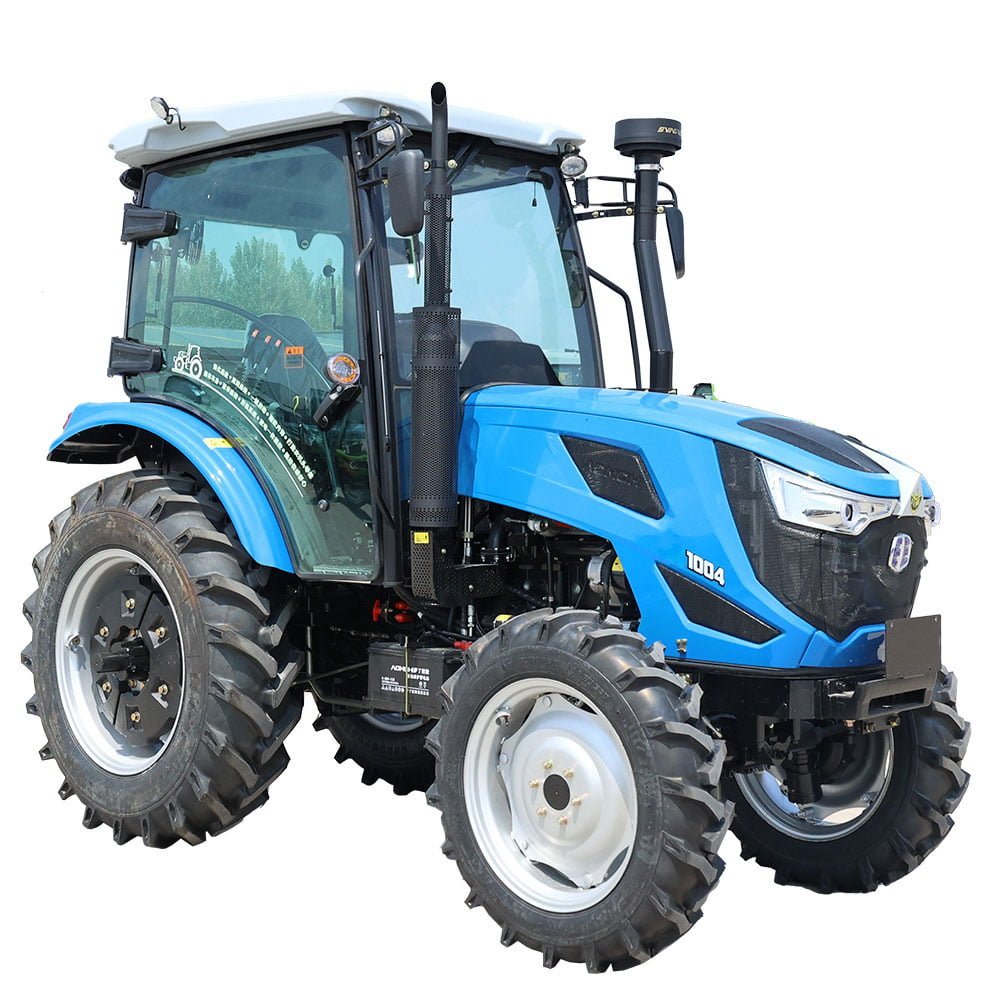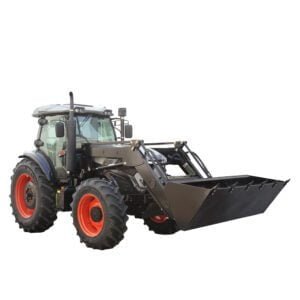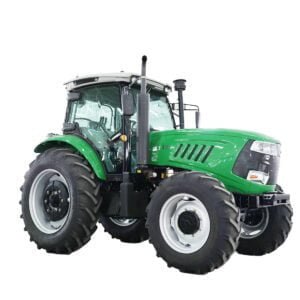Correo electrónico: [email protected] WhatsApp: 8618266768780
Cómo elegir la mejor maquinaria agrícola para tractores para su granja
Introducción
Seleccionar la mejor maquinaria agrícola para tractores para su granja es una decisión crucial que puede afectar significativamente la productividad y eficiencia de su granja. Con una amplia gama de opciones disponibles en el mercado, es esencial comprender los factores clave que pueden ayudarle a tomar una decisión informada. Esta guía le proporcionará una descripción general completa, que abarca todo, desde comprender las necesidades de su granja hasta evaluar características específicas de la maquinaria. Si usted es un agricultor experimentado o un recién llegado al sector agrícola, esta guía le brindará el conocimiento necesario para tomar la mejor decisión para sus operaciones agrícolas.
Entendiendo las necesidades de su granja

Antes de profundizar en los detalles de la maquinaria agrícola para tractores, es fundamental evaluar las necesidades específicas de su explotación. Este paso es fundamental, ya que la maquinaria adecuada puede mejorar significativamente la productividad, mientras que una elección incorrecta puede generar ineficiencias y mayores costos. Considere los siguientes aspectos para asegurarse de seleccionar el mejor equipo para su explotación:
Tamaño de la granja
El tamaño de su explotación agrícola es un factor crucial para determinar el tipo y la escala de la maquinaria que necesita. En explotaciones grandes, se requieren tractores más potentes y robustos para cubrir áreas extensas con eficiencia. Estos tractores suelen incorporar características avanzadas y mayor potencia para gestionar cargas de trabajo significativas. Por el contrario, las explotaciones más pequeñas podrían beneficiarse de tractores compactos, más maniobrables y rentables, ideales para tareas como segar, labrar y transportar cargas ligeras.
Tipo de cultivo
Cada cultivo requiere un tipo específico de tractor agrícola. Por ejemplo, cultivos en hileras como el maíz y la soja pueden requerir maquinaria diseñada para una siembra, pulverización y cosecha precisas en hileras. Por otro lado, los huertos y viñedos requieren equipos especializados que puedan desplazarse entre árboles y vides plantados con poca densidad sin causar daños. Comprender las necesidades específicas de sus cultivos le ayudará a elegir la maquinaria que optimice el rendimiento y minimice la mano de obra.
Condiciones del suelo
El tipo y las condiciones del suelo influyen significativamente en la selección de la maquinaria. Los suelos pesados y arcillosos pueden requerir tractores más potentes con buena tracción para arar y labrar eficazmente. Los suelos arenosos o francos, más fáciles de trabajar, podrían no requerir tanta potencia. Además, tenga en cuenta el terreno de su explotación; los terrenos accidentados o accidentados podrían requerir tractores con mayor estabilidad y neumáticos especiales para evitar resbalones.
Requisitos de la tarea
Es crucial identificar las tareas principales que necesita el tractor. Las tareas comunes incluyen arar, sembrar, pulverizar, cosechar y transportar. Algunos tractores están diseñados para realizar múltiples tareas con diversos accesorios, lo que los hace versátiles y valiosos para explotaciones con diversas necesidades. Para tareas especializadas, como empacar heno o aplicar fertilizantes, podría necesitar maquinaria especializada que garantice eficiencia y precisión.
Disponibilidad de mano de obra
Considere la disponibilidad y el nivel de cualificación de su fuerza laboral. Si cuenta con operadores experimentados, podría optar por maquinaria avanzada con controles y funciones sofisticadas. Sin embargo, si su fuerza laboral está compuesta por trabajadores con menos experiencia, una maquinaria más sencilla y fácil de usar podría ser una mejor opción para reducir la curva de aprendizaje y la posibilidad de errores.
Restricciones presupuestarias
El presupuesto siempre es un factor crucial. Si bien es tentador optar por la maquinaria más moderna y avanzada, es fundamental encontrar un equilibrio entre las características y la asequibilidad. Busque maquinaria que ofrezca la mejor relación calidad-precio, considerando tanto el precio inicial de compra como los costos de mantenimiento continuo. Las opciones de financiación y la maquinaria usada también pueden ser soluciones viables para optimizar su presupuesto.
Objetivos a largo plazo
Piense en sus objetivos agrícolas a largo plazo. ¿Planea expandir su explotación o diversificar sus cultivos? Invertir en maquinaria escalable y versátil puede ahorrarle actualizaciones y reemplazos frecuentes. La maquinaria adaptable a las necesidades cambiantes apoyará el crecimiento de su explotación y la evolución de sus requisitos operativos.
Integración tecnológica
La maquinaria agrícola moderna para tractores suele estar equipada con tecnologías avanzadas como guía GPS, dirección automatizada y análisis de datos. Estas características pueden mejorar significativamente la precisión, la eficiencia y la productividad. Evalúe la infraestructura tecnológica de su explotación y su disposición a integrar estas innovaciones. Si bien pueden implicar costos iniciales más elevados, los beneficios a largo plazo en términos de rendimiento y eficiencia pueden ser sustanciales.
Consideraciones ambientales
La sostenibilidad cobra cada vez más importancia en la agricultura. Considere maquinaria ecológica, con características que reduzcan el consumo de combustible y las emisiones. Las prácticas sostenibles no solo benefician al medio ambiente, sino que también pueden mejorar la reputación de su explotación y el cumplimiento de las normas regulatorias.
Tipos de Maquinaria agrícola tractor
La maquinaria agrícola para tractores es una categoría amplia que abarca diversos tipos de equipos, cada uno diseñado para realizar funciones específicas esenciales para la agricultura moderna. Comprender los diferentes tipos de maquinaria disponibles y sus características únicas le ayudará a seleccionar las herramientas adecuadas para satisfacer las necesidades de su explotación agrícola de forma eficiente. A continuación, se detallan los tipos comunes de maquinaria agrícola para tractores:
Tractores utilitarios
Los tractores utilitarios son máquinas versátiles que se utilizan comúnmente para las tareas agrícolas generales. Son la base de muchas explotaciones agrícolas gracias a su capacidad para realizar una amplia gama de tareas. Suelen tener una potencia moderada, lo que los hace adecuados para arar, labrar, transportar y operar diversos implementos como segadoras, cargadoras y retroexcavadoras. Su adaptabilidad los hace ideales para explotaciones pequeñas y medianas donde se deben realizar múltiples tareas sin invertir en múltiples máquinas especializadas.
Tractores para cultivos en hileras
Los tractores para cultivos en hileras están diseñados específicamente para el trabajo preciso que requiere este tipo de cultivo. Ofrecen una gran altura libre al suelo y anchos de vía ajustables, lo que les permite desplazarse entre las hileras de cultivo sin dañar las plantas. Estos tractores están equipados con sistemas de dirección avanzados y se utilizan a menudo para sembrar, cultivar y cosechar cultivos en hileras como maíz, soja y algodón. Su precisión y capacidad para realizar tareas delicadas los hacen invaluables para maximizar el rendimiento y garantizar la salud de los cultivos.
Tractores de huerto
Los tractores frutícolas son máquinas especializadas diseñadas para su uso en huertos y viñedos, donde el espacio entre árboles y vides es limitado. Suelen ser estrechos y de perfil bajo, lo que les permite maniobrar fácilmente sin dañar ramas ni frutos. Se utilizan para tareas como pulverizar, segar y transportar cosechas. Su diseño compacto y sus características especializadas ayudan a mejorar la eficiencia en huertos y viñedos, donde los tractores convencionales podrían tener dificultades para operar eficazmente.
Tractores compactos
Los tractores compactos son más pequeños, ligeros y maniobrables que sus homólogos más grandes. Son perfectos para pequeñas granjas, jardines y proyectos de paisajismo. A pesar de su tamaño, son lo suficientemente potentes como para realizar diversas tareas, como cortar el césped, excavar y transportar. Suelen incluir múltiples opciones de accesorios, como cargadores frontales, retroexcavadoras y quitanieves, lo que los hace increíblemente versátiles. Son una excelente opción para agricultores aficionados, pequeñas explotaciones y uso residencial.
Tractores subcompactos
Los tractores subcompactos son incluso más pequeños que los compactos, pero aun así ofrecen una potencia considerable. Están diseñados para propietarios con jardines grandes o terrenos pequeños que necesitan una máquina fiable para tareas ligeras. Son fáciles de operar y mantener, lo que los hace ideales para quienes se inician en el uso de tractores. Se utilizan comúnmente para cortar césped, nivelar terrenos y realizar trabajos de jardinería. Su pequeño tamaño les permite transitar por espacios reducidos donde los tractores más grandes no pueden acceder.
Tractores con tracción en las cuatro ruedas (4WD)
Los tractores con tracción en las cuatro ruedas ofrecen mayor tracción y estabilidad, lo que los hace ideales para terrenos difíciles y tareas pesadas. Son ideales para terrenos accidentados o irregulares, donde se requiere mayor potencia y control. La tracción en las cuatro ruedas garantiza que las cuatro ruedas reciban potencia, lo que reduce el riesgo de atascarse en tierra fangosa o suelta. Se utilizan a menudo para arar, labrar y realizar otras labores agrícolas intensivas, ofreciendo un rendimiento superior en condiciones difíciles.
Tractores especiales
Los tractores especializados están diseñados para tareas o entornos específicos. Entre ellos se incluyen tractores de gran altura para trabajar con cultivos altos, tractores de perfil bajo para trabajar en espacios reducidos y tractores equipados con orugas en lugar de ruedas para un mejor rendimiento en suelos fangosos o blandos. Los tractores especializados están diseñados para afrontar retos agrícolas únicos, ofreciendo soluciones que los tractores estándar podrían no ofrecer. Son esenciales para agricultores con necesidades específicas o que trabajan en entornos especiales.
Tractores industriales
Los tractores industriales están diseñados para tareas pesadas que van más allá del trabajo agrícola habitual. Se utilizan a menudo en la construcción, la silvicultura y otras industrias que requieren maquinaria potente para tareas como nivelación, excavación y elevación de cargas pesadas. Los tractores industriales son robustos, con chasis reforzados y motores potentes, diseñados para soportar condiciones extremas y trabajos exigentes. Si bien no se utilizan comúnmente en la agricultura tradicional, desempeñan un papel crucial en entornos agrícolas donde se requieren proyectos de infraestructura a gran escala o desarrollo de terrenos.
Tractores con tracción en dos ruedas (2WD)
Los tractores de dos ruedas motrices son los más comunes en explotaciones agrícolas pequeñas y para tareas más ligeras. Generalmente son más económicos y fáciles de mantener que los de tracción en las cuatro ruedas. Estos tractores son adecuados para terrenos llanos y secos y se utilizan habitualmente para segar, labranza ligera y transporte. Si bien no ofrecen la misma tracción y versatilidad que los tractores de tracción en las cuatro ruedas, su asequibilidad y simplicidad los convierten en una opción popular para muchos agricultores.
Tractores de orugas
Los tractores de orugas, equipados con orugas continuas en lugar de ruedas, proporcionan una tracción superior y reducen la compactación del suelo, lo que los hace ideales para operaciones agrícolas a gran escala en terrenos blandos o irregulares. Son especialmente útiles en condiciones de humedad, donde los tractores de ruedas podrían tener dificultades. Los tractores de orugas distribuyen el peso de forma más uniforme, minimizando el daño a la estructura del suelo, lo cual es crucial para mantener la salud del suelo y la productividad de los cultivos. Se utilizan a menudo para arar, sembrar y transportar cargas pesadas.
Evaluación de las características de la maquinaria
-
 Tractor 140HP con tracción en las 4 ruedas 1604
Tractor 140HP con tracción en las 4 ruedas 1604 -
 Tractor agrícola de 140 CV 1404
Tractor agrícola de 140 CV 1404 -
 Tractor agrícola 1304 de 130 CV
Tractor agrícola 1304 de 130 CV -
 El tractor de modernización QILU 260HP más pesado
El tractor de modernización QILU 260HP más pesado -
 Potente tractor de chasis pesado QILU 240HP
Potente tractor de chasis pesado QILU 240HP -
 Tractor agrícola QILU de 220 CV
Tractor agrícola QILU de 220 CV -
 Proveedor de tractores de China 100HP
Proveedor de tractores de China 100HP -
 Fábrica de tractores OEM 80HP
Fábrica de tractores OEM 80HP -
 Venta al por mayor del tractor de China 70HP
Venta al por mayor del tractor de China 70HP
Al seleccionar tractores agrícolas, es importante considerar características específicas que pueden afectar el rendimiento, la eficiencia y la facilidad de uso. Estas características pueden variar considerablemente entre modelos y fabricantes, por lo que es fundamental comprender qué ofrece cada una y cómo se adapta a sus necesidades agrícolas. A continuación, se detallan las características cruciales a considerar al elegir tractores agrícolas:
Potencia y rendimiento del motor
El motor es el corazón de cualquier tractor y su potencia se mide en caballos de fuerza (HP). La cantidad de caballos de fuerza requerida depende de las tareas que planee realizar y del tamaño de su explotación. Los motores de mayor potencia son necesarios para tareas pesadas como arar campos extensos, transportar cargas pesadas y operar implementos complejos. Por el contrario, las explotaciones más pequeñas y las tareas más ligeras pueden no requerir tanta potencia, lo que le permite ahorrar en combustible y costos de mantenimiento. Además, considere la eficiencia de combustible del motor y las normas de emisiones, ya que pueden afectar tanto los costos operativos como la sostenibilidad ambiental.
Tipos de transmisión
El tipo de transmisión de un tractor puede afectar significativamente su funcionamiento y facilidad de uso. Existen varios tipos de transmisión, cada uno con sus ventajas:
- Transmisión manual:Ofrece un control preciso sobre la velocidad y la potencia, pero requiere más habilidad para operar.
- Transmisión automática:Simplifica la operación con cambios de marcha automatizados, lo que facilita la tarea a los operadores menos experimentados.
- Transmisión hidrostática:Proporciona ajustes de velocidad suaves e infinitos sin necesidad de embragar, ideal para tareas que requieren cambios frecuentes de velocidad.
Hidráulica y toma de fuerza (TDF)
Los sistemas hidráulicos son esenciales para operar implementos como cargadoras, retroexcavadoras y segadoras. La capacidad hidráulica de un tractor, medida en galones por minuto (GPM), determina la potencia disponible para estos implementos. Una mayor capacidad de GPM se traduce en un rendimiento hidráulico más potente y con mayor capacidad de respuesta. El sistema de toma de fuerza (TDF) es otra característica crucial, ya que permite que el tractor transfiera la potencia del motor a varios implementos. Cada tractor tiene diferentes configuraciones de TDF (p. ej., TDF trasera, TDF central), así que elija la que mejor se adapte a las necesidades de sus implementos.
Comodidad y ergonomía
La comodidad del operador es un aspecto crucial que influye directamente en la productividad. Los tractores modernos incorporan diversas características diseñadas para mejorar la comodidad y reducir la fatiga durante largas jornadas de trabajo:
- Diseño de cabinaLas cabinas cerradas brindan protección contra el clima, el ruido y el polvo, y a menudo cuentan con control de clima para mayor comodidad.
- Asientos:Los asientos ajustables y acolchados con sistemas de suspensión ayudan a reducir la fatiga del operador.
- Disposición de los controles:Los controles intuitivos y de fácil acceso mejoran la facilidad de uso y reducen la curva de aprendizaje para los nuevos operadores.
- Visibilidad:Las ventanas grandes y los diseños de cabina bien diseñados ofrecen una mejor visibilidad, lo que mejora la seguridad y la eficiencia.
Accesorios y versatilidad
La posibilidad de usar una amplia gama de accesorios puede aumentar significativamente la versatilidad de un tractor. Evalúe la compatibilidad del tractor con diversos implementos, como arados, gradas, sembradoras, pulverizadores y cargadoras. Los sistemas de enganche rápido facilitan el cambio de accesorios, ahorrando tiempo y esfuerzo. Algunos tractores incorporan tecnología que mejora la funcionalidad de accesorios específicos, como sistemas de siembra de precisión o dirección automatizada para la labranza.
Integración de tecnología
Los tractores modernos suelen estar equipados con características tecnológicas avanzadas que pueden mejorar la eficiencia, la precisión y la productividad. Algunas de estas características incluyen:
- GPS y sistemas de guía:Ayuda con la siembra, fertilización y pulverización precisas proporcionando datos de ubicación en tiempo real y dirección automatizada.
- Telemática:Permite la monitorización remota del rendimiento del tractor, las necesidades de mantenimiento y la eficiencia operativa.
- Análisis de datos:Sistemas integrados que recopilan y analizan datos para optimizar las prácticas agrícolas y mejorar la toma de decisiones.
- Automatización:Los modelos avanzados ofrecen capacidades de funcionamiento semiautónomo o totalmente autónomo, lo que reduce la necesidad de intervención constante del operador.
Calidad de construcción y durabilidad
La calidad de construcción y la durabilidad de un tractor son esenciales para su rendimiento y fiabilidad a largo plazo. Busque tractores con chasis robustos, materiales de alta calidad y una reputación de durabilidad. Considere la garantía, la disponibilidad de repuestos y centros de servicio, ya que estos factores pueden afectar significativamente los costos de mantenimiento y el tiempo de inactividad. Los tractores de marcas reconocidas suelen ofrecer garantías integrales y mejores redes de soporte, lo que le garantiza obtener las reparaciones y repuestos necesarios cuando los necesite.
Caracteristicas de seguridad
La seguridad es primordial en cualquier operación agrícola. Evalúe las características de seguridad del tractor, incluyendo:
- ROPS (Estructura de protección antivuelco): Protege al operador en caso de vuelco.
- Cinturones de seguridad:Indispensable para asegurar al operador.
- Luces de seguridad y reflectores:Mejora la visibilidad en condiciones de poca luz.
- Apagado de emergencia:Permite al operador detener rápidamente el tractor en caso de emergencia.
Coste y relación calidad-precio
Al evaluar las características, también es crucial considerar el costo total y la relación calidad-precio. Esto incluye el precio de compra inicial, los costos operativos (combustible, mantenimiento, reparaciones) y la vida útil estimada del tractor. Una mayor inversión inicial en un tractor bien construido y con múltiples características puede ser rentable a largo plazo gracias a una mayor productividad, menores costos de mantenimiento y un mejor valor de reventa. Las opciones de financiamiento y las características de ahorro, como la eficiencia de combustible y el bajo mantenimiento, también pueden influir en el valor total.
Impacto ambiental
A medida que la sostenibilidad cobra cada vez más importancia, considere el impacto ambiental del tractor. Busque modelos que cumplan con las normas de emisiones vigentes y ofrezcan características ecológicas, como motores de bajo consumo de combustible y sistemas avanzados de control de emisiones. Los tractores sostenibles no solo reducen la huella ambiental de su explotación, sino que también pueden optar a incentivos o subvenciones gubernamentales.
Comparación de marcas y modelos

Con tantas marcas y modelos disponibles, comparar sus especificaciones y características es crucial. Realizar una investigación exhaustiva y leer las opiniones de los clientes puede proporcionar información valiosa.
Las mejores marcas:
- John Deere:Conocido por su durabilidad y tecnología avanzada.
- Qilu:Ofrece una amplia gama de tractores compactos y utilitarios.
- Massey Ferguson:Reconocido por su maquinaria robusta y confiable.
- Nueva Holanda:Proporciona soluciones innovadoras para la agricultura moderna.
Mantenimiento y soporte
Un mantenimiento adecuado es crucial para garantizar la longevidad y la eficiencia de su tractor agrícola. Además, contar con servicios de soporte confiables puede ahorrarle tiempo y dinero a largo plazo.
Consejos de mantenimiento:
- Inspecciones regulares: Verifique el desgaste y reemplace las piezas según sea necesario.
- Mantenimiento programado:Siga el programa de servicio del fabricante.
- Almacenamiento adecuado:Guarde la maquinaria en un área protegida para protegerla de los elementos.
Servicios de soporte:
- Soporte del distribuidor:Acceso a repuestos y técnicos expertos.
- Recursos en línea:Manuales, tutoriales y guías de solución de problemas.
- Opciones de garantía:Garantías extendidas para protección adicional.
Consideraciones ambientales
Las prácticas agrícolas modernas priorizan cada vez más la sostenibilidad y la responsabilidad ambiental. Elegir tractores agrícolas ecológicos puede ayudar a reducir el impacto ambiental de su explotación.
Características ecológicas:
- Eficiencia de combustible:La maquinaria que utiliza menos combustible reduce las emisiones de carbono.
- Estándares de emisiones:Cumplimiento de las normativas de emisiones locales e internacionales.
- Materiales sostenibles:Utilización de materiales reciclables y duraderos en la construcción.
Conclusión
Elegir la mejor maquinaria agrícola para tractores para su explotación implica considerar cuidadosamente diversos factores, como las necesidades específicas de su explotación, los tipos de maquinaria, las características, las marcas, los costos, los requisitos de mantenimiento y el impacto ambiental. Al tomarse el tiempo para evaluar estos aspectos, podrá tomar una decisión informada que mejore la productividad y la sostenibilidad de su explotación. Invertir en la maquinaria adecuada no solo mejora la eficiencia operativa, sino que también contribuye al éxito a largo plazo de su negocio agrícola.
Preguntas más frecuentes
¿Cuál es el factor más importante a tener en cuenta al elegir? Maquinaria agrícola tractor?
El factor más importante es comprender las necesidades específicas de su granja, incluido el tamaño de la granja, el tipo de cultivos cultivados y las tareas requeridas.
¿Cómo determino la potencia adecuada del motor para mi tractor?
La potencia del motor debe basarse en las tareas que necesita el tractor. Las explotaciones agrícolas más grandes y las tareas más exigentes requieren mayor potencia.
¿Existen opciones de financiamiento disponibles para la compra? Maquinaria agrícola tractor?
Sí, muchos fabricantes y distribuidores ofrecen opciones de financiación, incluidos préstamos, arrendamientos y planes de pago.
¿Con qué frecuencia debo realizar el mantenimiento de mi tractor?
Siga el programa de servicio recomendado por el fabricante, normalmente cada 200 a 300 horas de funcionamiento o anualmente.
¿Cuáles son los beneficios de elegir maquinaria de tractor ecológica?
La maquinaria ecológica reduce el consumo de combustible y las emisiones, lo que contribuye a la sostenibilidad ambiental y reduce potencialmente los costos operativos.
Sobre nosotros
Shandong Qilu Industrial Co., Ltd. es un fabricante y exportador profesional que integra el desarrollo y la producción de excavadoras, cargadoras y tractores. Brindamos el mejor servicio, absolutamente.
Mensajes recientes
demostración de vídeo
-1.png)
¡Póngase en contacto con nosotros hoy!
¿Alguna pregunta, cotización o consulta? Haga clic en el botón para enviar el mensaje.
Qilu Industrial siempre estará aquí para ayudar.









